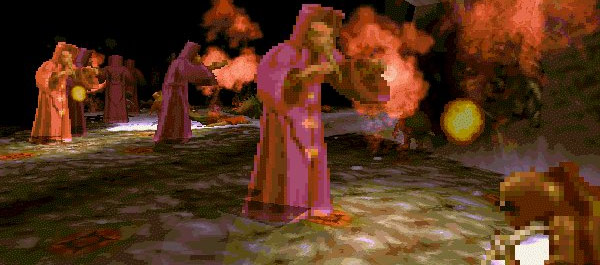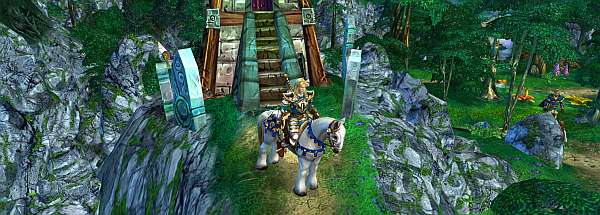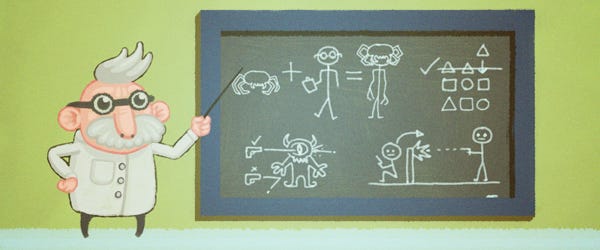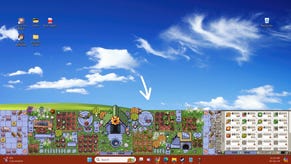The Very Important List Of PC Games, Part 4/5
Young people. Good grief. Your ignorance is as plain as those spots on your greasy face. Don't you know anything? Can't you be bothered to learn anything? Did you even read the words of esteemed colleagues Rossignol, Walker and Smith detailing the first three parts of this Olympian list of The Most Important PC Games Of All Time? I am quite sure that I, Deacon Meer, am wasting my time attempting to impart my own wisdom on this matter to your feckless minds, as is Intel's AppUp developer program for having the consideration and grace to so thoughtfully sponsor this series. You're probably all too busy fiddling with your genitals and snorting heroin at one of those 'rave parties' I hear young people go to every night. I shall say my piece regardless.
These, you snivelling little godless wretches, are a selection of the PC's finest hours. Put down whatever bestial pornography you're staring at on your portable telephone device and pay attention. You sicken me. You probably won't even bother reading the phrase "Part 4/5" at the top and thus will have an ignorant whine that your favourite game or genre does not appear. I shall take this as an open admittance of your stupidity, and recommend to your parents that you are immediately taken out of internetschool and kept locked in an airing cupboard for the good of society.
PLEASE NOTE: these games are ordered according to a cryptic logic code based on Aztec sun prophecies that you are far too backwards to possibly decipher.
Aliens versus Predator (original)
RELEASE DATE: 1999
IMPORTANCENESS: Clamped forever to our faces

Games based on populist movie licenses aren't all mindless thumpathons with dreadful level design and ludicrous bossfights, you know. If someone actually bothers to fully examine the nature and behaviours of the characters in their license, they can achieve magical things. AvP was not just another game about killing monsters in the dark: it was a game about being inside the skulls of iconic movie monsters, and fleshing out those beasts far more than any movie ever did. Three playable perspectives - alien, predator, human marine - and all so distinct, and each's motivations rendered sympathetic despite encountering them all as enemies from the other perspectives. To boot, AvP made much more of the first-person perspective than most of its gun-crazed genre-mates ever did. While the telltale targeting reticule was ever-present, this is a game about survival and observation, a claustrophobic odyssey of fear and strange abilities. Add to this multiplayer modes that deftly realised the fantasy of the titular What If? and have you a smart, far-reaching reinvention of first-person shooters. It's one that puts the lie to the oft-made claim that only Half-Life saved the genre from stifling cynicism and machismo in the twilight years of the 20th century.
Audiosurf
RELEASE DATE: 2008
IMPORTANCENESS: Can hear it in our dreams

I've said this before and it provoked great outrage from readers and colleagues alike - so I shall say it again. If you don't enjoy Audiosurf, I truly believe you do not fully understand the importance of music. Criticism of Audiosurf's puzzle and point-scoring mechanics - slight, strange thing that they are - is to completely misunderstand its purpose and achievement. It identifies the tiny, beautiful crossover point between games and music - that microgalaxy of emotion and imagination, of colours and sound, where we lose ourselves in a euphoric place that doesn't exist outside of our minds. Neither arch nor overcomplicated, it is simply about interpreting music as something visual, and the fizzing pan-sensory consequences of this. The constant dance of the player's ship from left to right is all that's necessary to turn the game from sensory observation to real engagement, and that wonderful sense that the song is all around you. True, there is plenty of music that simply doesn't work, with many 'courses' feeling awkward and even irritating, but when it does - wow. The rush of colour, the curve of a track at a crescendo, the sharp downward plummet as a finale looms, the joyful bobbing of an itchy beat... And the rush of sheer pride when you beat your own, or better yet a friend's, high score on a beloved song. It is, after all, your song. No-one else should own it.
Blade Runner
RELEASE DATE: 1997
IMPORTANCENESS: It did things you people wouldn't believe

The adventure game is not dead. Far from it: I find it to be vampiric in its deathlessness, forever feeding on its past, never growing old, never growing wise. Others will argue that point and present fine evidence to the contrary, but when I think of Blade Runner I become furious. That was what was supposed to happen. A few annoying pixel-hunt puzzles aside, Blade Runner was this genre growing up, moving to new places, finding evolving purpose and relevance. Why was it so alone? Why were we so much more distracted by traditional adventure games going 3D or having more grown-up stories? Blade Runner, for God's sakes, introduced choice and dilemma, change and chaos theory, action and detective work into a staid setup. This could have been the branching point to another age. It is so completely, absolutely different from anything else in its venerable genre, throwing down a forward-looking gauntlet that no-one's picked up some 14 years later. Maybe it happened too late, maybe it was too clever for its own good, or maybe the appetite just wasn't there as shooters rose and rose. Perhaps that's for the best. Blade Runner remains singular, a lone tear in the rain of so many lesser, cowardly games.
Bioshock
RELEASE DATE: 2008
IMPORTANCENESS: Beyond that of the sea

Uh-oh. If there's a poison chalice in this list, it's Irrational's spiritual sequel to System Shock 2. Of course, if it had never been described as a spiritual sequel to System Shock 2 there never would have been a problem. But this is a list of importance, not a list of perfection - and while we can all agree Bioshock was a less mechanically ambitious game than its remarkable predecessor, had it not happened, and had it not been a commercial success, the action gaming landscape today might look very different. Do you want endless pseudo-military shooters, whose greatest use of the brain is a cover system? Or do you want something that creates a tantalising new fiction and aesthetic from the ground up? Rapture is one of the most remarkable gaming worlds ever created, creating instantly iconic figures that stood out a mile and posed a glut of fascinating questions in an age otherwise dominated by same-faced growly soldiermen. Though unfortunately mis-hyped as offering far more roleplaying and decision-making than it ultimately did, its real achievement was to calmly state that action games did not have to be merely glossily violent games. Art and thoughtfulness stood proudly equal to the action - and perhaps even surpassed it. Dwell not on the missteps that so troubled us at the time of release; dwell on how well it proved that even the most mainstream of shooters can be so much more than weapon-obsessed power fantasies.
Colonization (original)
RELEASE DATE: 1994
IMPORTANCENESS: Imperial

A sequel that looked inwards rather than outwards. This is, to this day, so unbelievably rare. Civ follow-up Colonization, focusing slowly on one continent during the period 1492 to 1850, didn't seek to be bigger - it sought to look closer. The history of the world is all well and good, but it does not truly put you in the mind or shoes of a nation and its ruler. Colonization does: the greed and pride of burgeoning national identity, the slow, painstaking steps necessary to achieve survival, subsistence and eventually economic success, and the complex and violent consequences of that latter. It concerns the struggle to even be a nation, not the struggle to be the biggest nation, and that strikes a profound difference from its conquest-hungry peers. Sure, it side-stepped the more unsavoury elements of America's birth, but it achieves the remarkable feat of telling, essentially, a hero's journey within a strategy context, without silly cutscenes or achingly earnest exposition. Most of all, it's a lesson that if you'd just dig a little deeper where you stand, you don't need to move anywhere else.
Command & Conquer (series)
RELEASE DATE: 1995 and beyond
IMPORTANCENESS: Tiberionic

While largely we have looked to specific installments rather than series in this list, C&C is a rare exception: it is its near-constant presence throughout the history of PC gaming that creates its importance, not so much the particular achievements of particular iterations. C&C, for at least the first two-thirds of its lifespan, has defined strategy gaming. While nominally an evolution of systems created in Dune 2, it has always been about pursuing the extremes. Although that old core chestnut - drag a box to command, click on a power station to conquer - has never quite gone away, at the same time C&C has never taken the easy route. Madly switching from apocalyptic sci-fi to grim alterna-history to pantomime soap opera to open comedy to shockingly exploitative modern conflict to all-out gloss and, sadly, to a well-intentioned but cramped and misjudged finale, it has changed and striven far more than it's often given credit for. In recent times it has ceded its position as strategy flag-bearer, but none of the other RTS games in this list would possibly exist without it - and that includes those that strove to not be like it as much as it does those that so shamelessly copied it. A years-long inspiration like no other, for both good and ill.
Darwinia
RELEASE DATE: 2005
IMPORTANCENESS: Artificially high

A milestone moment in indie gaming - the first time I can remember that there was same level of anticipation and excitement as there was for a publisher-funded game. While much of that was admittedly within jaded journalist circles rather than the outside world, there was nonetheless something incredibly striking about those screenshots. It looked bold and weird, lavish and beautiful: a world away from the spiky visual crudity we at that time expected from the then tiny field of indie gaming. It also bucked the trend of selling games based on high-tech graphics, instead employing an immediately memorable art style instead. We get a lot of that now. We didn't then, and I'm quite sure it contributed highly to the current indie wonderland we live in. Of course, Darwinia was a distinctive action-strategy game in its own right, throwing out direct control in favour of herding pixels and employing directional surges rather than targeted strikes.
Deus Ex
RELEASE DATE: 2000
IMPORTANCENESS: C'mon, it's Deus Ex

I feel deeply anxious whenever I have to write anything about Deus Ex. It's that important. There is a reason it's the first game on so many PC gamers' lips. While today it may offer a hilariously cartwheeling narrative, hideous voice-acting and far too much 'We've seen the Matrix 20 times!' it still carries that unmistakable air of wanting videogames to be so much more than they'd been before. It's a protest, a call to arms, an uprising against what games were in danger of becoming. A world that explores you as you explore it, the constant choice of how to behave and how to fight and the still-rare sense of wanting to educate you while taking your own intelligence entirely seriously. That, and reminding men that it really is not cool to walk into the women's toilets.
Diablo II
RELEASE DATE: 2000
IMPORTANCENESS: Hellishy so

HIT SPLAT LOOT HIT SPLAT LOOT HIT SPLAT LOOT HIT SPLAT LOOT DING HIT SPLAT LOOT HIT SPLAT LOOT HIT SPLAT LOOT HIT SPLAT LOOT DING HIT SPLAT LOOT HIT SPLAT LOOT HIT SPLAT LOOT HIT SPLAT LOOT DING HIT SPLAT LOOT HIT SPLAT LOOT HIT SPLAT LOOT HIT SPLAT LOOT DING HIT SPLAT LOOT HIT SPLAT LOOT HIT SPLAT LOOT HIT SPLAT LOOT DING HIT SPLAT LOOT HIT SPLAT LOOT HIT SPLAT LOOT HIT SPLAT LOOT DING HIT SPLAT LOOT HIT SPLAT LOOT HIT SPLAT LOOT HIT SPLAT LOOT DING. If you don't understand the sheer entertainment of this salt-moreish formula, I don't understand you. Many have tried and failed to sieze Diablo II's title as king of the hack'n'slash tribe (Torchlight is probably the most successful) but no other has truly nailed its magic mix of idiocy, perseverance, grit and pride.
Dune 2
RELEASE DATE: 1992
IMPORTANCENESS: Controls the universe

Our great-grandfather who art in strategy heaven, Dune II be thy name. Thy House come, thy will be done, on Earth as it was on Arrakis.
Give us this day our daily spice, and forgive us our harvesting, as we forgive those who harvest against us.
And lead us not into sandworms' mouths, but deliver to us Fremen.
For he who controls the spice controls the universe, for ever and ever, Westwood.
Dungeon Keeper
RELEASE DATE: 1997
IMPORTANCENESS: Anti-heroic

Another one of those what if/genre truncation moments. Dungeon Keeper should have been the launching board for the calcifying management genre to explore new territory, but outside of the incredible Startopia and the underwhelming Evil Genius, that ambition apparently curled up and died when Bullfrog did. Perhaps there’s another chance for the business-building concept to reach for the skies, as the current glut of FarmVille clones surely has to give way to more ambition at some point. Dungeon Keeper though: probably my most-played game on this list. This has relatively little to do with the concept of being the bad guy, which was forever pantomime at best, and a whole lot to do with an easy blend of construction and destruction. You admire what you’ve built, and you feel compelled to defend it. It just works, to coin a phrase. Of course, also key was the rarely-explored idea of imbuing the unseen strategy/management overseer with real vestiges of character. That the cursor is a taloned hand that, with a click, can cruelly slap a passing minion and be rewarded with fear or rage, achieves more scene-setting and personality than 1000 cutscenes every could.
The Elder Scrolls III: Morrowind
RELEASED: 2002
IMPORTANCENESS: It’s the last of a lost race, baby

When I worked out which games I was going to write about it, there was at least half a dozen I worried about what I could say, how I could possibly summarise their importance. Turns out, they weren’t a problem. Morrowind, a game I’ve written thousands of words about previously, has however proven to be. I can’t compress it like that. It’s a huge, incredibly strange, endlessly surprising world that I can’t quite believe was actually made, and so many years ago. It doesn’t seem possible that anyone could or would do it now, let alone then. If I’ve seemed ungracious to Bethesda’s RPGs in recent times, it’s purely because I expect so very much of them based on this incredible, impossible achievement.
Fallout / Fallout 2
RELEASE DATE: 1997/1998
IMPORTANCENESS: Apocalyptic

All RPGs owe a debt to Dungeons and Dragons, but Fallout at least has the good grace to not be so totally brazen about. The post-apocalypse is one of gaming’s most appealing settings, and I’d say Fallout and STALKER are twin kings of our beloved wasteland. Casually amoral and calculatedly unfocused yet almost scientific in their statistics, the original Fallouts are a world away from the earnest epic narratives of fantasy roleplaying. That it is so often hard to mention these games without nodding to the famous ferocity of its fans speaks volumes: in a dry desert of lightweights, an RPG that really does the heavy-lifting was always going to inspire grand passion.
Freelancer
RELEASE DATE: 2003
IMPORTANCENESS: Galactic

Speaking of RPGs that stray bravely from the beaten path, here’s this shiny relic of a time when Microsoft still cared about PC gaming. A space sim with a heart of roleplaying, it twins trading with purpose rather than pure economics. It’s not nearly referenced enough. Sure, it may not have the sprawl and hands-off approach of its great ancestor Elite, but it has bravado, gloss and excellent starship argy-bargies. It’s also hugely accessible compared to the niche-catering handful of space sims we’ve seen in the last decade. While the hardcore will always call for more hardcore, making such complex systems open to all is by far the harder achievement.
Grim Fandango
RELEASE DATE: 1998
IMPORTANCENESS: More than heaven

Or, the day that LucasArts grew up. I don’t envy the great adventure company at that period – surely stuck between the rock of an enormously successful formula and the hard place of innovating within it without scaring anyone off. Grim Fandango failed to move the puzzles on in any meaningful way (and in some cases even regressed), but it did bring a new seriousness to the table without losing any of the playfulness. As sombre and introspective as it is wry and ludicrous, it moved us to care about a Mexican skeleton and his fat, orange best mate. Tragic, beautiful and charming, it is for me the last word in traditional adventure games.
King’s Bounty: The Legend
RELEASE DATE: 2008
IMPORTANCENESS: Legendary

More than anything, Katauri’s first King’s Bounty exemplifies my increasingly repeated mantra that the best thing about the PC as a gaming platform is that you can never, ever second-guess it. With no one company calling all the shots, every day bears the legitimate chance of discovering something completely unexpected and brilliant. Back when this Russian rethink of the Might & Magic formula cropped up, I confess to having been feeling a little cold-footed about RPS’s purpose. All these rubbishy low-budget Euro-games, militaristic multiplayer shooters and indenti-strategy fare: was this really what we wanted to write about every day? Then, all of a sudden, the most generic-sounding thing I’ve ever heard of has me fighting battles inside my own clothing, divorcing zombie wives and making snakes fight ghosts. Sure, it was far too long, often incoherent and aggravatingly unbalanced, but sometimes pointing out a good thing’s flaws is completely redundant. Unhinged, unbelievably good-natured and Pringle-like in the happy ferocity of how compelling it was, it completely transformed my feelings about PC gaming – and even my very concept of what PC gaming had become.
Mass Effect 2
RELEASE DATE: 2010
IMPORTANCENESS: Massive

Throw it all out and start again. There was absolutely no reason Bioware needed to do that: one of the advantages of having so few competitors with enough resources to actually compete is essentially having a captive audience. Bioware could have carried on pushing out derivatives of the KOTOR formula again and again. Clearly, they didn’t want to. Mass Effect 2 might be pretty sparse on what we tend to call roleplaying, but like so many of the best games (for instance, the one below this) the result is something that’s easy to comprehend but hard to categorise. So much so that we felt compelled to give it its own genre: guns and conversation. Big, bolshy space opera with action and character in equal quantities, a world away from its more expansive but plodding predecessor. ‘Shephard’ is such an astonishing creation – so generic in so many ways, especially the male version, but being the vanguard of these 21st century star wars’ pounding purpose and thoughtful action-drama makes him/her the hero that we all ache to be.
Minecraft
RELEASED: Not yet, technically
IMPORTANCENESS: Still building

Not a single advert. No tutorial. A game about reconfiguring blocks in a more pleasing way. A game about survival. A virtual online world without any of the cynicism or hollow pseudo-socialising.
The world sat up and took notice. A man become a millionaire without the support of a corporation. People who barely even played games built impossible creations.
People still talk, almost with a degree of horror, of the strangeness that such a thing would be such a success. Why can’t they see that it was inevitable? Don’t fight so hard and spend so much to bring people to your door. Just leave it wide open and see what happens.
Minesweeper
RELEASE DATE: 1989 and onwards
IMPORTANCENESS: Explosive

Match-3 hogs all the glory, but it was Minesweeper that birthed casual games and played a profound role in the establishment of the PC as a gaming platform. While a console did and does require the specific decision to be a gamer, Minesweeper created legions of gamers by stealth. ‘I’m not really gaming, it’s just a little thing I do between spreadsheets.’ I’m amazed how much Microsoft has failed to capitalise on the power of bundling a game with its operating system, but at the same time I appreciate that this was bottled lightning.
Farmville’s sort of doing the same thing for the modern age, as is Angry Birds on iPhone, but without unnecessarily disparaging either I’d argue that both will prove to be far less valuable despite being far more profitable. Minesweeper encouraged thinking and the lure of being smart, rather than being simply a matter of chance and time (though both do play their part). It is maths, it is strategy, it is gambling. It is also, to this day, one of the most tension-building games ever created.
Peggle
RELEASE DATE: 2007
IMPORTANCENESS: PEGGLE!

You’ve probably noticed I’ve tended towards describing these games’ importance in terms of context rather than specific achievements, and that’s a tune I really can’t change for this. Before Peggle, the gulf between ‘our’ games and what we rather dismissively called casual was enormous. We’d sneer in contempt, convinced they were for stupids and bored housewives. Peggle proved how wrong we were – it united the cold-warring tribes. And all because it was incredibly enthusiastic; excited about it existing, and steeped so completely shamelessly in goofy humour that any lingering aroma of cheese was discarded. Most of all, it understood that games, that collection of flickering pixels and electronic sounds, can make people feel good. Peggle is, at its heart, a game that wants to reward you simply for playing it, simply for the act of pressing and button and watching things happen. And just say its name, out loud. Peggle. Peggle! Peggggg-ullll. Doesn’t that feel good? Truly, an ode to joy.
Planescape: Torment
RELEASE DATE: 1999
IMPORTANCENESS – Can change the nature of a man

The game that breaks all the rules. Far too wordy, far too grim, far too peculiar, steeped in cynicism about humanity and absolutely determined to give you a hard time at all stages. That’s exactly why Black Isle’s dark opus works so well. The game of heartbreak, the game of mortality, the game of treachery, the game of philosophy, the game of life. The mentality of the most determined, individualistic fan art game, somehow given a budget and dozens of hours of playtime. The impossible game, the greatest cRPG ever made.
I’ve met a lot of big-name developers in my time, normally to point a microphone in their faces and ask questions they’ve already heard 30 times. I’ve bever been moved to say anything fannish, as my interest as a gamer and a hack has always been the product not the people. Planescape lead Chris Avellone, though: that’s the one and only time I didn’t keep my awkward cool. God forever bless him for laughing at my shitty talking skull gag and clinking beer glasses with me.
Plants vs Zombies
RELEASE DATE: 2009
IMPORTANCE: Organic

If Peggle was the game to make traditional games embrace casual, PvZ was where the waters became entirely muddied. Taking the tower defence genre and carving it into something both insanely accessible and thrillingly imaginative, it's a lot closer to being a bona fide phenomenon that we might realise. It's everywhere right now, still cropping up on new platforms and on new players' lips even though it's two years old. Everyone knows the song, there's garden ornaments, it's a quest inside World of Warcraft, there's even going to be a boardgame, for Crazy Dave's sakes. It's seeped in the mass cultural consciousness more than most of the list, and without anyone entirely realising. It's also deft, endlessly charming proof that games for non-gamers don't have to be non-gamey. This is, after all, a strategy game at its heart, and even if much of it relies on timing, it casually introduces concepts and systems the world at large would otherwise have run screaming from. PvZ broke down barriers just as surely as would a troupe of bucket-headed zombies chew through a Wall-Nut.
But never, of course, a Tall-Nut - gaming's greatest-ever hero.
The Sims
RELEASE DATE: 2000
IMPORTANCE: Severely underestimated

We’ve observed a few times how perplexing it is that no-one really tried to take on the Sims, in terms of simulating human behaviour and relationships. The other strangely unexplored element of it, to me, is that as well as being a sorta-management game it’s an RPG where your character often doesn’t do what they’re told. That is, of course, because they’re supposed to be human. My girlfriend told me to do more cleaning the other day. I haven’t done it yet: which is not to say I won’t, but purely that humans don’t operate in such a blindly say-and-do way. At least not in a healthy society. I’d love to see a full-on RPG explore that – a character that broadly shares your intentions for them but whose own urges, interests and exhaustion often takes precedence. That, as well as the sex and aspirational house-decoration, is the key to the Sims – the arrogance and thrill of controlling people who don’t really want to be controlled. Which is, of course, why it’s all the more entertaining if you recreate people you know in it.
Spelunky
RELEASE DATE: 2008
IMPORTANCE: Crusading

Ah, the procedurally-generated Indiana Jones game. I suspect RPS’ greatest-ever oversight was not going absolutely grade-A fuckin’ crazy-nuts about Spelunky. Mangling roguelikes and platformers together in a fashion that revealed their truths rather than trod old ground, it gets back to that singular importance of having your world, your game. I could never have the slightest bit of interest in seeing someone beat Mario 3’s World 3-4 (or whatever the hell else Nintendo bores go on about) in 24 seconds. What on Earth’s that got to do with me? Spelunky, like Minecraft or Desktop Dungeons, gives me my own world, my own challenge, my own epic narrative. Get the treasure, save the girl, blow up a load of rocks and monsters and probably die doing it. Sounds good to me.
Total Annihilation/Supreme Commander
RELEASE DATE: 1997/2007
IMPORTANCE: Totally supreme

Apologies for the slightly awkward double-whammy there, but I trust you’ll appreciate the lineage. As discussed earlier, C&C has been the backbone of so much of real-time strategy’s history, and that also includes inspiring rival games to not be like it. TA almost aggressively bellows “this is not how war should be.” It wants big, huge machine genocide, not a handful of chunky things picking each other off. It is grand and epic, cold and fiddly and completely, proudly inhuman. Supreme Commander continued the tradition, and proved it was just as relevant a good decade later. It indulges warfare rather than fiction, and with that bird’s eye view the stakes seem so much higher.
Ultima VII
RELEASE DATE: 1992
IMPORTANCE: Ultimate

While we've covered a fair few RPGs in this list, they've tended to be games focused on specific areas of the genre. Ultima VII, the main series' highpoint, is the RPG that does it all. It's a society simulator as much as it is a free-form fantasy tale. Baking, survival, law, music-making, vomiting, crime, drugs, racism, buying bus tickets... It's a project of astonishing scope - so much so that it was split into two parts, each with their own expansion pack. To recreate the sheer scale of U7's ambition in a modern game would surely involve enough gigabytes to sink Ireland. No wonder the Ultima series slumped so dramatically following VII - this game aimed so high that there was almost nowhere left to go but down.
Warcraft II: Tides of Darkness
RELEASE DATE: 1995
IMPORTANCENESS: A portent

Perhaps not one of the more interesting strategy games on this list by today's standards, but that doesn't mean it's not a landmark game. This is where Blizzard really became BLIZZARD, the goliath that we know and love/fear today. Battle.net (well, the first RTS to use it), expansion packs, the semi-toon visual style, eyewatering sales figures, uber-lore: it all started here. And while Warcraft 1 had started the multiplayer RTS ball rolling, it was WC2 that really got it doing so at speed. WC2 is why we have WoW, and why we have StarCraft. This is the tap that the money-hose is connected to.
Warhammer 40,000: Dawn of War
RELEASE DATE: 2004
IMPORTANCENESS: There is no importanceness. Only war

Relic's Warhammer 40,000 real-time strategy game didn't really come into its own until its second expansion, Dark Crusade, where suddenly it all made sense. This wasn't just a C&C-like with Games Workshop art - it was an attempt to create an absolutely enormous wargame, packed with units and factions and abilities. Not for this the laser-focused dual- or tri-race balancing act of its peers, but instead a giant toychest stuffed with science-fictional conflict. Forever a bit of a let-down in singleplayer terms, it flexed its enchanced muscles in skirmish and multiplayer: so much choice, so much indulgence. While final expansion pack Soulstorm was not its strongest, just glancing at the total unit roster following it remains extraordinary. It's a huge game, and it also expertly pulls 40K out of its tabletop ghetto and into something far more universal. Dawn of War II has so far been a much bolder game, but perhaps a less impactful one. I'm pretty sure Relic are absolutely determined to correct that latter, however. In a couple of years and a couple of expansions, no doubt it will be similarly huge.
World of Warcraft
RELEASE DATE – 2004
IMPORTANCE – All the money. All of it.

Oh, it’s too easy to sneer, isn’t it? WoW might be built upon a troubling foundation of feeding incessant virtual goods hunger, but it’s vitally important. It keeps the PC the world’s foremost gaming platform, it proves that massive creative ambition and scale is not a barrier to massive financial success and it’s entered popular culture at large in a way that few games ever have. It is shaping and evolving not just a genre, but an entire industry. And it’s still growing: there’s still so much more it might yet do.
Personally though, the first year of the game, early adventures with friends in fantasy lands before they became dominated by stat-fiends, will forever be some of my most memorable gaming time. Making it up as we went along, finding ways to defeat what we thought we impossible odds, laughing at ridiculous hats, being thrilled by unlocking a brand-new ability. I am deeply, deeply sad that WoW -and probably no other MMO – can recapture that. We just didn’t know we were in for or what we doing then. I miss that so, so much.
X-COM: UFO Defense AKA UFO: Enemy Unknown
RELEASED- 1994
IMPORTANCE – God-king

Ah, how fitting that this list should end with this. As your didactic tutor, there is simply no other game I could more strongly recommend to you as homework. The hybrid of all genres, the never-bettered original. A game of fear, elaborate plotting and terrible, terrible sacrifice. That the Gollops are not regularly releasing big, successful games with their names in the title, Meier-style, is a constant mystery to me. I mean, Julian’s next game is a barely-credited, barely hyped Ghost Recon spin-off for 3DS (though excitingly it sounds a little X-COMesque). Absurd.
Sometimes, I must admit, all I really want from gaming is a re-release of this with a modern interface. I don’t need new graphics or new units or improved AI or a first-person-perspective. I just want to play this, forever.
Please note that this post is but one fragment of a larger list, which in total covers over 100 of what RPS feels is the PC's most important games (but not all of them). You can find the other parts to date here. More is yet to come.
This feature has been kindly sponsored by:










